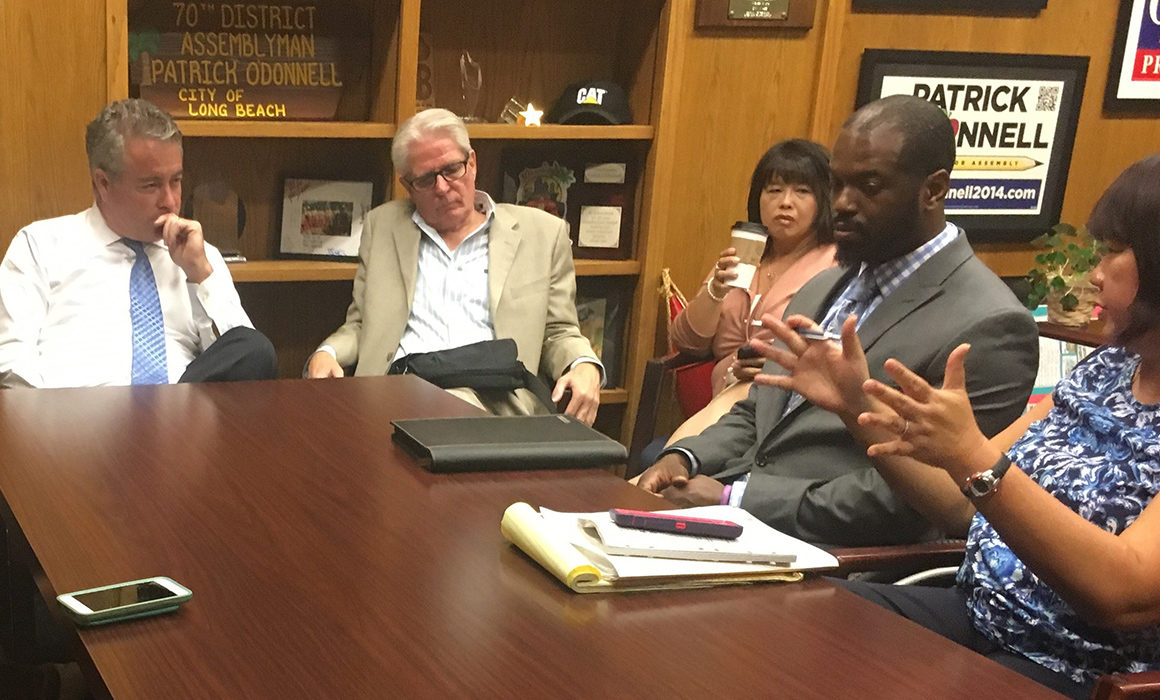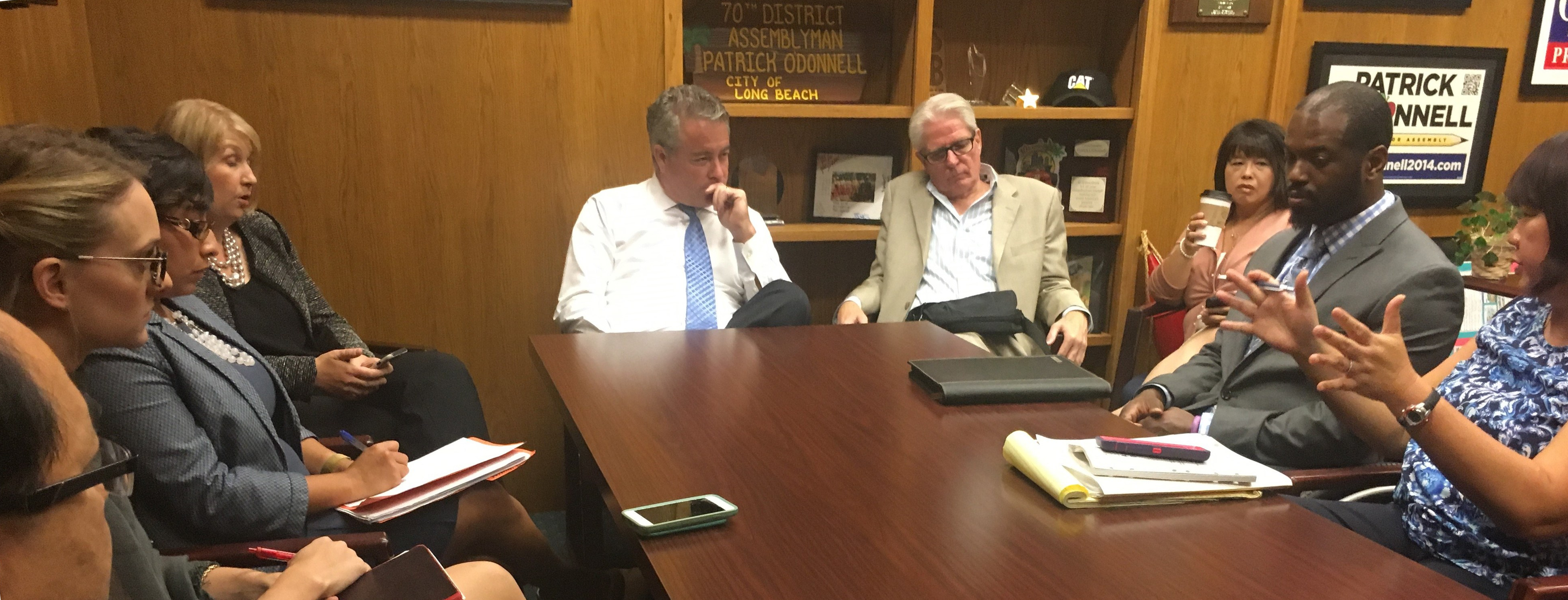
AB 1217 shelved
Thanks to the efforts of CTA’s members, legislative advocates and coalition partners, AB 1217 by Assembly Member Raul Bocanegra (D-Pacoima) and Sen. Anthony Portantino (D-La Cañada Flintridge) was sent to the inactive file and is unlikely to resurface next year.
The bill would have established a privately run but publicly funded STEM school in Los Angeles using public funds. It would have set a dangerous precedent, creating a school with taxpayer money with no real accountability — and robbing public schools of needed funding. AB 1217 was another example of Eli Broad and his fellow billionaires trying to shape public schools to fit their own agenda. See kidsnotprofits.com for more information about this agenda and what to do about it.

Angie Wei of the California Labor Federation, far right, expresses concerns about AB 1217 to Assembly Member Patrick O’Donnell (in white shirt). At the table are representatives of a broad coalition of education, labor and civil rights groups urging opposition to the bill, including Eric Harris, Sacramento NAACP; Jai Sookprasert, California School Employees Association; Christina Marcellus, Small School Districts Association; Sara Bachez, California Association of School Business Officials; and CTA’s Seth Bramble. (O’Donnell’s chief of staff and consultants to the Assembly Education Committee are also present.)
CTA-supported bills passed
Several CTA-sponsored or supported bills were sent to Gov. Jerry Brown for his signature.
CTA-co-sponsored AB 699 by Assembly Member Patrick O’Donnell (D-Long Beach) protects students by ensuring that school districts adopt and monitor procedures and policies that prohibit discrimination based on immigration status, are not collecting information regarding citizenship from students or families, and are adopting policy modeled by the California Attorney General limiting assistance with immigration enforcement.
CTA-co-sponsored AB 1360 by Assembly Member Rob Bonta (D-Alameda) ensures all students will have equal access to all schools by prohibiting charter schools from setting any admission preferences that would limit the enrollment of students with disabilities, English learners, low-income children or students of color. Any admissions preference would have to adhere to the California Constitution and federal law, and must be approved by the charter school at a public hearing. Charter schools would be prohibited from requiring parental volunteer hours as a criterion for admission. And all students will have due process when facing disciplinary action such as suspension or expulsion.
CTA-co-sponsored AB 45 by Assembly Member Tony Thurmond (D-Richmond) provides financial assistance to school districts to offer affordable housing so that school employees can live in the communities in which they work. This will be key in attracting and retaining educators in the face of the critical teacher shortage.
CTA-supported AB 830 by Assembly Member Ash Kalra (D-San Jose) eliminates the high school exit examination and removes it as a graduation requirement.
CTA-supported SB 285 by Sen. Toni Atkins (D-San Diego) prohibits public employers from deterring or discouraging union membership by public employees.
Passage of SB 751 by Sen. Jerry Hill (D-San Mateo), Assembly Member O’Donnell and Assembly Member Adam Gray (D-Merced) represents the culmination of a long debate about school district reserves and the need to impose a cap. CTA supported the bill after ensuring it was amended to change the local reserve cap to 10 percent (except for basic aid and small school districts). These amendments reflect the shared values of providing California’s students educational resources while reserving funds for unexpected circumstances.
Bills stalled
CTA-opposed SB 328 by Sen. Portantino requires the school day for middle schools and high schools to begin no earlier than 8:30 a.m. School start times should be decided at the local level with community input. Local leaders, with this input, are best prepared to make decisions that meet the needs of the students. SB 328 did not get the votes necessary to clear the Assembly.
CTA-opposed AB 1220 by Assembly Member Shirley Weber (D-San Diego) extends the probationary period for educators from two years to three, does not provide due process, and does not include support in years 1 or 2 of the probationary period, but only in year 3. It also calls for setting up yet another unproven process in school districts — an Individualized Improvement Plan for educators. Instead, we should build on Peer Assistance and Review (PAR), which has been working in many districts and already exists in state law.
CTA-supported AB 1164 by Assembly Member Thurmond provides that if, during the first two years of probation, an employee has had unsatisfactory evaluations and has participated in a beginning teacher induction program (if the employee doesn’t already have a clear credential), the employer may offer a third year of probation. In such a case, the employer must provide written notice to the employee with specific information on what needs to be improved, and must refer the employee to a PAR program that has been collectively bargained. An employee in the third year of probation has due process protections and may request a hearing if fired.
Bills in process
Two other charter school bills seeking to ensure transparency, accountability and equity in charter schools will continue to make their way through the legislative process next year.
CTA-co-sponsored AB 1478 by Assembly Member Reggie Jones-Sawyer (D-Los Angeles) ensures transparency by requiring entities managing charter schools are subject to the Brown Act (open meetings), Public Records Act (open books), and two laws preventing conflicts of interest: Political Reform Act and Government Code 1090.
CTA-co-sponsored SB 808 by Sen. Tony Mendoza (D-Artesia) authorizes only the local school board of a district in which a charter school would be located to approve a petition to establish the school there. County and state boards are not authorized.
CTA Strong
At press time, the U.S. Supreme Court agreed to hear Janus v. AFSCME, a case that aims to take away the freedom of working people to join together in strong unions. CTA is adamant that no court case will stop our determination and advocacy for our students and our profession. Look for more coverage in the next issue.
The Discussion 0 comments Post a Comment